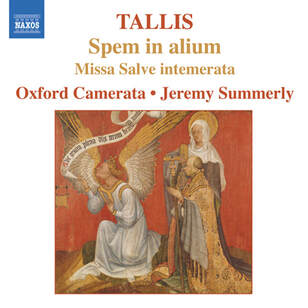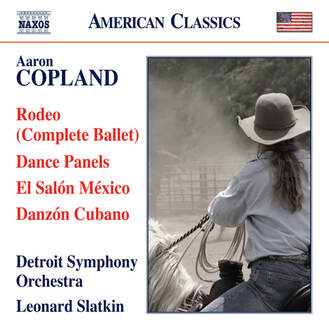|
One of my goals for 2024 is to listen to at least one CD from my collection every week, ideally a CD I haven’t listened to, and write a brief review of it. For starters, I’m continuing my survey of the Naxos 30th Anniversary box set.  Thomas Tallis’s Spem in alium is, quite simply, an astonishing piece of music. It’s written for eight choirs of five voices (soprano, alto, tenor, baritone, and bass), and each part is completely distinct from the others. Yes, that adds up to 40 independent voices—a truly massive amount of music, and a remarkable undertaking for any group of singers. But scope isn’t everything, of course; thankfully, it is also—not surpring for Tallis—incredibly beautiful. This recording, by the Oxford Camerata and Jeremy Summerly, captures both the magnitude and splendour of this music with impeccable artistry and terrific sound. While I haven’t done a side-by-side comparison with other recordings, I can’t imagine this music sounding much better. This recording was released in 2005 to celebrate the 500th anniversary of Tallis’s birth, and it would seem that the goal was to present some of the composer’s largest works. Spem in alium is paired with Salve intemerata—at over twenty minutes, one the longest single-movement pieces of the sixteenth century. This is followed by Missa Salve intemerata and three English-language anthems. All in all, it’s a wonderful programme, and the sound throughout is nothing less than spectacular. Here’s my one note of caution, however: In my experience, many people tend to think of ‘classical music’ as ‘background music’, and due to its undeniable beauty, this recording may seem like an ideal candidate for multitasking. Please, please, please do not make this mistake. Not only is this music that deserves your undivided attention, I believe it demands it, particularly Spem in alium. If you are only half-listening, Spem in alium can end up sounding impossibly dense and indistinct, something akin to Renaissance note salad. Instead, use good speakers or high-quality headphones, and turn it up loud so you can hear the fine details. Then, let the music wash over you.
0 Comments
One of my goals for 2024 is to listen to at least one CD from my collection every week, ideally a CD I haven’t listened to, and write a brief review of it. For starters, I’m continuing my survey of the Naxos 30th Anniversary box set.  When many people think about American ‘classical’ music, they think of the music of Aaron Copland. And no wonder. While Copland isn’t the first composer who tried to capture the sound of America in his music, something about his approach sounds immediately and unmistakably right. His string writing sounds like wind blowing across the open prairies. His melodies evoke the something of the Old West, but (in my opinion) never to the point of being saccharine. Even when he wrote in a less popular idiom, such as in his brilliant Piano Variations, his pointillistic ‘thriftiness’ (his term) sounds jazzy and exciting in his angularity. For the record, I adore Copland’s music, and while some may write him off as being too ‘popular’, I deeply respect his ability to write in more than one idiom, to keep his voice intact while straddling different styles. Simply stated, I try to do the same in my music. This selection of Copland’s music all falls under the dance umbrella. Rodeo, a ballet that is better known as a series of dance episodes, is heard in its entirety, and it’s delightful. Dance Panels is more abstract in character, but unmistakably Copland, and it has its fair share of surprises. In my opinion, it’s a piece that deserves to be better known. El Salón México and Danzón Cubano are both a lot of fun, full of rhythmic energy and verve. In terms of the repertoire, there isn’t a weak link to be found. Leonard Slatkin is the ideal interpreter for this music. I find Slatkin to be an incredibly energetic conductor (his recording of Carmina Burana is wonderfully unhinged), sometimes to the point of excess, but that’s exactly what this music needs. The Detroit Symphony Orchestra sounds terrific. Highly recommended. I decided to do a lot during Freshers Week here at Durham University. I went to every meal, every pub crawl, every outing, and I met a lot of other first-year postgraduate students. Most of them had recently finished their undergraduate degrees and were just starting their masters, and while I didn’t hide the fact that I was starting a PhD and hadn’t been a student for some time, I think most of them assumed that I was roughly in their age group, simply by virtue of me being there. I forget what the exact conversation was about, but I think I said something about how difficult it was to get visas for my wife and son. One of my new friends got a puzzled expression, looked at me and, after a pause, asked something like, “Sorry, but how old are you?” Then the story came out: I’m 42 years old. I don’t have a master’s degree, and my bachelor’s degree is from 20 years ago. I left my job in the States to begin PhD studies. My wife and I sold our house, our car, and many of our belongings to move to England with our son. And, make no mistake, it was the right thing to do.
I tell this story because, when I look back at the 2023 that was, I recognise that it was easily one of the most eventful and consequential years of my life. I did something—I’m in the midst of doing something, in fact—that most people wouldn’t do, and it’s the kind of thing that is not easily undone. Some people might think I’m brave, and some might think I’m foolish; I prefer to view it pragmatically: Elise and I decided what we wanted to do, we prayed and discerned that it was worth doing, and we did what we had to do to make it happen. Of course we don’t know what will happen next, but honestly, do we ever? Here’s something that I’ve believed for some time, but I really learned in 2023: It’s never too late to try something new; it’s never too late to change course. If you don’t like what you’re doing, you can change it. Even if you do like what you’re doing—which was the case with me—there’s no reason you have to keep doing it forever. It doesn’t have to involve changing jobs or moving continents, although it did for me. For most people, it may not be nearly as dramatic. In fact, it could be something small and subtle, something most people won’t even notice. Maybe it’s a book you want to write, a skill you want to learn, a good habit you want to build, or a bad habit you want to break. Whatever. But that thing that’s in the back of your mind, that dream you have, the one you keep brushing off and thinking, “No, it’s too late. I’m too [blank], or I’m not [blank] enough, or…” That’s enough from the inner critic, don’t you think? It’s not too late. In fact, it might be the perfect time. Why not try, and find out? Here’s to a 2024 full of new adventures. |
AuthorChris Massa is a US-born musician based in Durham, England. You are on his site right now. Archives
June 2024
Categories
All
|
|
Copyright © Christian David Massa
|

 RSS Feed
RSS Feed